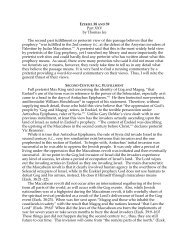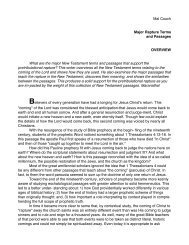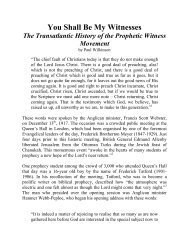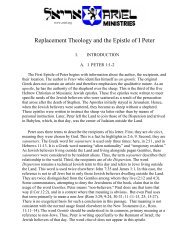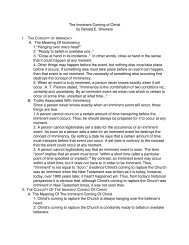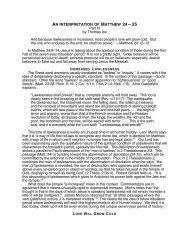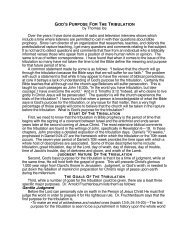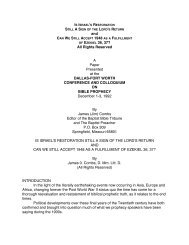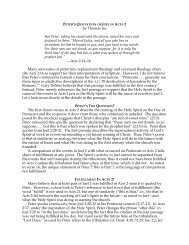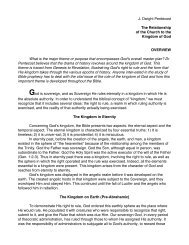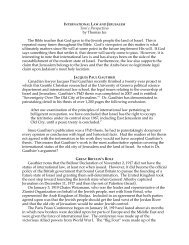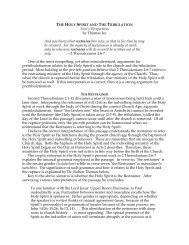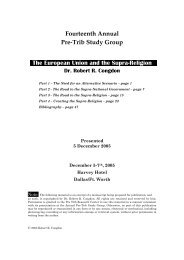PDF version - Pre-Trib Research Center
PDF version - Pre-Trib Research Center
PDF version - Pre-Trib Research Center
Create successful ePaper yourself
Turn your PDF publications into a flip-book with our unique Google optimized e-Paper software.
Christian Zionism History — Ice — Page 8<br />
national restoration of the Jews to Palestine was resident in the first nativeborn<br />
generation at the close of the seventeenth century in which Increase<br />
Mather played a dominate role. The men who held this view were Puritans, .<br />
. . From that time on the doctrine of restoration may be said to have become<br />
endemic to American culture. 72<br />
“It was Increase Mather’s view that this final and greatest reformation of the Christian<br />
world would be led by the Jewish people ensuing upon their restoration to the Holy<br />
Land.” 73<br />
From the earliest times, American Christianity has always tilted toward support of<br />
the restoration of national Israel in the Holy Land. American Christians, when<br />
compared with Euro-Asian Christianity has always had a philo-Semitic disposition.<br />
Thus, it is not surprising that this tradition continues today, especially in dispensational<br />
circles.<br />
EARLY AMERICAN SUPPORT FOR ISRAEL<br />
With a significant number of English speaking Christians during the last 400 years<br />
thoroughly saturated with Jewish restoration theology, it should not be surprising that<br />
many such Christians in the last two hundred years have risen up to play key roles in<br />
the establishment of the modern state of Israel.<br />
It should not be considered strange that <strong>Pre</strong>sident John Quincy Adams expressed<br />
his desire that “the Jews again [were] in Judea, an independent Nation, . . . once<br />
restored to an independent government and no longer persecuted.” 74 <strong>Pre</strong>sident<br />
Abraham Lincoln in a meeting with Canadian Christian Zionist, Henry W. Monk, in<br />
1863 said, “Restoring the Jews to their homeland is a noble dream shared by many<br />
Americans. He (the Jewish chiropodist of the <strong>Pre</strong>sident) has so many times ‘put me on<br />
my feet’ that I would have no objection to giving his countrymen a ‘leg up’.” 75<br />
NINETEENTH CENTURY BRITISH RESTORATIONISM<br />
The 1800s marks a high point in British premillennialism and a corresponding apex<br />
for Christian Zionism. Many contemporary accounts critical of Christian Zionism focus<br />
their emphasis upon J. N. Darby and the rise of dispensationalism as the foundation for<br />
British Restorationism. As one examines the record, such is not the case. The real<br />
advocates of Christian Zionism in Britain were primarily Anglican premillennialists. By<br />
the mid-nineteenth century, about half of all Anglican clergy were evangelical<br />
premillennialists. Iain Murray said, “some seven hundred ministers of the<br />
Establishment were said to believe that Christ’s coming must precede His kingdom<br />
upon earth. This was in 1845.” 76 Murray went on to add that, “the number almost<br />
certainly increased in the latter half of the century.” 77 An example of such clergymen<br />
would be J. C. Ryle (1816–1900), who wrote a <strong>Pre</strong>-Millennian Creed. 78 The wave of<br />
premillennialism is what produced in Britain a crop of Christian Zionists that led to<br />
political activism which culminated in the Balfour Declaration.<br />
Anthony Ashley Cooper (1801–1885), later Lord Shaftesbury, is said by Tuchman to<br />
have been “the most influential nonpolitical figure, excepting Darwin, of the Victorian<br />
age.” 79 As a strong evangelical Anglican, he is said to have based his life upon a literal<br />
acceptance of the Bible and was known as the “Evangelical of Evangelicals.”<br />
Shaftesbury was the greatest influence for social legislation in the nineteenth century.<br />
He was led into acceptance of premillennialism by Edward Bickersteth, which then<br />
gave rise to his views of Jewish Restorationism. 80 Lord Shaftesbury said concerning his



